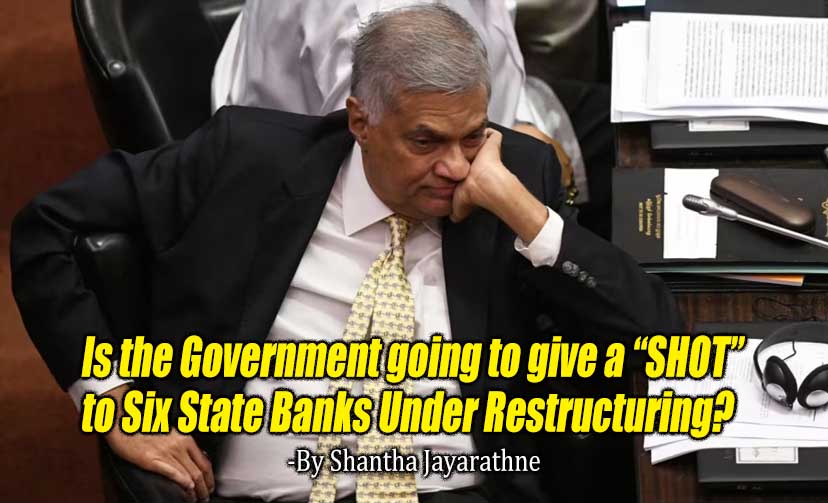By Shantha Jayarathne

(Lanka-e-News -18.Oct.2023, 8.30PM) In a political move that's raising eyebrows and concerns, Sri Lanka's government is now setting its sights on the nation's six state-owned banks. It seems like the government, which previously made a significant financial hit on the Employee's Provident Fund (EPF), is not stopping there.
To "give a shot" usually implies delivering a forceful blow, and the Sri Lankan government certainly gave the EPF a significant one. Yet, surprisingly, the impact didn't resonate as expected with the public. It's a stark reality that our citizens have grown somewhat immune to such actions. This phenomenon is not unique to Sri Lanka; it aligns with Naomi Klein's book, "The Shock Doctrine," which details how citizens in crisis-stricken countries can become desensitized to their rulers' actions. Consequently, the EPF's loss of over 3.5 trillion rupees, projected to last until 2038, has barely registered on the public's radar. To put it in perspective, that's equivalent to approximately 10.6 billion dollars at the current exchange rate, a sum greater than the cost of constructing 20 ports of the size of Hambanthota which is sold to China for a song. Though it is sold, the loan taken by the government is still being paid with interest by the Sri Lanka Ports Authority (SLPA).
Surprisingly, the EPF's membership seems largely unaware of the severity of this financial "shot." While some civil and professional bodies have staged protests, even those have waned in recent times. Recognizing this complacency, Ranil Wickramasinghe appears poised to exploit the situation. The government has listed 127 state enterprises under 19 groups for restructuring including six banks and nine financial institutions. For the complete list, see here.
https://www.treasury.gov.lk/web/department-of-public-enterprises-links-list-of-public-enterprises/section/banking-finance
Steps are underway to expedite the restructuring of these institutions, with a separate entity overseen by one Mr. Suresh Sha.
In the near future, government-owned bank shares may become available for purchase, either by local or foreign entities, enabling them to wield significant financial influence over the country. This development could render the Central Bank powerless in the face of external interests. The list of institutions being restructured can be found here.
https://www.treasury.gov.lk/web/sru/section/team
Among the entities targeted for restructuring are Bank of Ceylon (BOC), People's Bank, National Savings Bank (NSB), State Mortgage and Investment Bank, Housing Development Financial Corporation, LankaPuthra Development Bank, Regional Development Bank, National Savings Bank, and ETF. Expressions of interest (EOI) will soon be solicited, with seven institutions already in the process of calling for EOI. Committees have also been established to provide advisory support.
https://www.treasury.gov.lk/api/file/4de1c2f4-dd51-495e-aafb-fc41ff5ad8b8
A recent revelation by the Sunday Times exposed the urgency of restructuring these banks. Rising bad debt percentages and liquidity constraints have significantly impacted their capital positions. According to an IMF diagnostic analysis, a capital injection of 1.4 trillion rupees is required to mitigate the impact of debt moratoriums for the private sector and debt restructuring. More details on this can be found here.
https://www.sundaytimes.lk/231015/business-times/six-state-owned-banks-to-undergo-urgent-reforms-535667.html
Ranil Wickramasinghe frequently embarks on foreign tours, often accompanied by VIP passengers. Currently, he is visiting China. The inclusion of individuals like Mahindananda Aluthgamage, Rohita Abegunawardene, and Suresh Wadiwel on last month's tour to the UN Conference in the USA has raised questions. These trips, funded by taxpayers, covered not only business class airfare and accommodation but also daily expenses, prompting concerns about the responsible use of public funds.
The sale of land to India, the port to China, and the allocation of wind power generation in Mannar basin to Adani, along with plans to allocate 15,000 acres in the North and East for solar power generation to India, highlight a concerning trend. The question arises: to whom will the government sell the state banks? It is disheartening to see that there are still individuals who accept such actions by the government.
Now, more than ever, the people must unite and hold the Ranil-Rajapakse regime accountable. This government's efforts to postpone elections, undermine democracy, suppress lawful protests, and cling to power against all odds demand a resolute response from the citizens.
Former Senior Consultant SLIDA
[email protected]
---------------------------
by (2023-10-18 15:11:10)
Leave a Reply